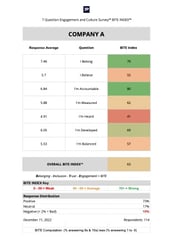In the pages of The Patient Organization, I laid out the 7 Question-7 Promise Framework, which allows everyone within your company to align themselves with your mission by deciding if they can answer “yes” to questions of belonging, belief, accountability, measurement, communication, development and balance. The ultimate benefit of this process is the creation of the type of workplace environment that can power an Organizational Operating System (OOS).
If your organization has a solid Organizational Operating System in place, then it may seem as if your business essentially runs itself. This is because the OOS is designed with operational efficiency in mind, along with the intention of clarifying internal responsibilities and establishing systems for delegating resources to assorted tasks in accordance with the organization’s mission.
Because Organizational Operating Systems are inherently systematized, they come arrayed with ingrained sets of tools and procedures intended to eliminate the need for speculation about the proper course of action from moment to moment. Meanwhile, if your OOS is of high quality, its natural outworking should ensure that the affirmative responses your employees have provided to the Seven Questions are consistently maintained.
At this point, it is important to draw some distinctions, because you might be tempted to believe that your business already has a fully functioning Organizational Operating System that has manifested itself naturally as the years have progressed. Although there may be some elements of a legitimate OOS lurking within your organization, chances are you are simply running an organic operating system. In cases like these, your business may seem to hum along smoothly, but the absence of clearly stated values is likely to impose an unintended hindrance on your potential for perpetual productivity.
No matter which OOS you opt to install within your business, you should make sure it positively shapes certain facets of your organization and prepares your company to maintain the momentum it generates. There are several fundamental functions of your organization that the OOS should play an integral role in enhancing. Among them are the strategic planning processes, which your OOS should naturally aid in perpetuating. Over the course of the year, the OOS should also ensure that positions held within the enterprise are routinely evaluated and reassessed for suitability.
In addition, your OOS should ensure that employee performance measurement standards are continually refined and communicated and that a suitable method for making sure your employees are heard is firmly installed. Also, your OOS will need to provide an ingrained pathway for employee development in order to establish the mechanisms by which employees can acquire new skills, roles, and responsibilities, and take ownership of those processes.
When all is said and done, you can evaluate the performance of your Organizational Operating System by the natural efficiency with which it can enact and maintain the “yes” responses you have received from your employees to the Seven Questions. If you have the correct OOS in place, coupled with navigation and a trajectory provided by the 7Q7P Framework, your organization will be a momentum machine and can maintain that velocity no matter what obstacles stand in its way.





